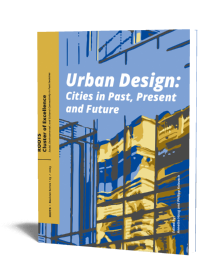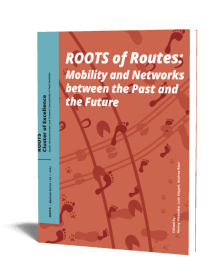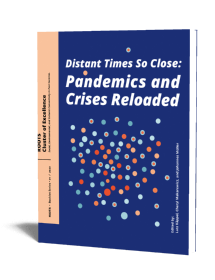Stories of Waste and Value
Roots of a Circular Economy
Edited by Jens Schneeweiß | 2024

Stories of Waste and Value
Roots of a Circular Economy
Edited by Jens Schneeweiß | 2024
Paperback ISBN: 9789464262971 | Imprint: Sidestone Press | Format: 170x210mm | 112 pp. | Roots Booklet Series • 04 | Language: English | 4 illus. (bw) | 56 illus. (fc) | Keywords: waste; discard; non-economic value; socioeconomic status; wealth in prehistory; recycling; resources | download cover | DOI: 10.59641/b0e6y7z8a9
Read online or downloaded 312 times
-
Digital & Online access
This is a full Open Access publication, click below to buy in print, browse, or download for free.
-
Buy via Sidestone (EU & UK)
-
Buy via our Distributors (WORLD)
This title is not available via our UK or USA distributors. You can place an order above in the EU section. We can ship worldwide, shipping costs will be added during ordering based on destination.
-
Bookinfo
Paperback ISBN: 9789464262971 | Imprint: Sidestone Press | Format: 170x210mm | 112 pp. | Roots Booklet Series • 04 | Language: English | 4 illus. (bw) | 56 illus. (fc) | Keywords: waste; discard; non-economic value; socioeconomic status; wealth in prehistory; recycling; resources | download cover | DOI: 10.59641/b0e6y7z8a9
Read online or downloaded 312 times

We will plant a tree for each order containing a paperback or hardback book via OneTreePlanted.org.
Growing mountains of waste, decreasing resources and global environmental pollution confront us today with challenges of unprecedented dimensions. Against this background, interest in sustainable and resource-saving concepts is increasing; it is not uncommon to fall back on (supposedly) traditional approaches from times past. But what do we really know about the roots of the circular economy? What turns everyday objects into worthless rubbish, what turns others into highly sought-after objects? What actually is waste?
Researchers from various disciplines in the humanities and natural sciences have joined forces to get to the bottom of these and similar questions in short stories. In them, they provide en passant or explicit insights into the broad spectrum of methods available to research today. The selected stories are loosely based on the authors’ research projects, whereby emphasis was placed on bringing together different disciplinary perspectives. Moreover, it is noteworthy that all academic levels – from Master’s degree students to professors – are represented. The result of these sometimes very different perspectives on seemingly everyday things leads to entertaining, sometimes surprising and often instructive insights that are quite intentionally thought-provoking about our world today.
Also available in German.
Preface
Johannes Müller
Treatment of Waste – Past and Present: An Introduction
Konrad Ott
Chapter 1: Hidden Dirt, Hidden Knowledge
The Cognitive Value of Dirt
Lorenz Kienle, Khurram Saleem, Ulrich Schürmann
Environmental aDNA – The Whole World in a Handful of Dirt
Jens Schneeweiß
A Closer Look at Dirty Layers
Svetlana Khamnueva-Wendt and Jens Schneeweiß
Chapter 2: Facing Stereotypes
Out of Sight Is Out of Mind: Bronze Age Waste Management – Back to the Year 1800 BCE
Jutta Kneisel, Janusz Czebreszuk, Wiebke Kirleis, Johannes Müller
From Weeds to Construction Material: Rye in Germany
Benjamin Claaßen
Turning Soil, Changing Perspectives – How Modern Sustainability Concepts and Past Ways of Life Meet in the Garden
Dana Zentgraf and Jens Schneeweiß
Chapter 3: Use. Reuse. Refuse
“Water, Water Everywhere,… nor Any Drop to Drink” – Water Waste, Reuse, and Quality in Ancient and Medieval Times
Nicolas Lamare, Max Grund, Guillermo Torres
Use and Reuse of Lead in the Middle Ages – A Biography of Lead
Paweł Cembrzyński and Marie Jäcker
Timber Recycling – or: How to Get People to Recycle?
Jutta Kneisel and Lisa Shindo
Shit Happens – Dealing with Faeces in the Middle Ages
Max Grund, Bente Majchczack, Jens Schneeweiß
Chapter 4: Learning from the Past? Today’s Challenges for the Future
Is this Trash Yet? On Rejecting and Depositing
Elena Diehl and Sonja Windmüller
Once Around the World – Plastics, the Sea as a Transport Route and the Archaeology of the Future
Katrin Knickmeier, Katrin Schöps, Ilka Parchmann
Contributors
For further reading
Imprint
Dr. Jens Schneeweiß
Jens Schneeweiß (Dr. phil., Humboldt University Berlin, 2004) is a scientist at the Institute of Pre- and Protohistoric Archaeology at Kiel University and the LEIZA (Leibniz Centre for Archaeology), Department of Baltic and Scandinavian Archaeology in Schleswig, Germany. He is deputy speaker of the sub-cluster ROOTS of Conflict of the Cluster of Excellence “ROOTS – Social, Environmental, and Cultural Connectivity in Past Societies” in Kiel. As an associate professor of prehistory and early history, he teaches at the Georg August University in Göttingen, Germany.
Abstract:
Growing mountains of waste, decreasing resources and global environmental pollution confront us today with challenges of unprecedented dimensions. Against this background, interest in sustainable and resource-saving concepts is increasing; it is not uncommon to fall back on (supposedly) traditional approaches from times past. But what do we really know about the roots of the circular economy? What turns everyday objects into worthless rubbish, what turns others into highly sought-after objects? What actually is waste?
Researchers from various disciplines in the humanities and natural sciences have joined forces to get to the bottom of these and similar questions in short stories. In them, they provide en passant or explicit insights into the broad spectrum of methods available to research today. The selected stories are loosely based on the authors’ research projects, whereby emphasis was placed on bringing together different disciplinary perspectives. Moreover, it is noteworthy that all academic levels – from Master’s degree students to professors – are represented. The result of these sometimes very different perspectives on seemingly everyday things leads to entertaining, sometimes surprising and often instructive insights that are quite intentionally thought-provoking about our world today.
Also available in German.
Contents
Preface
Johannes Müller
Treatment of Waste – Past and Present: An Introduction
Konrad Ott
Chapter 1: Hidden Dirt, Hidden Knowledge
The Cognitive Value of Dirt
Lorenz Kienle, Khurram Saleem, Ulrich Schürmann
Environmental aDNA – The Whole World in a Handful of Dirt
Jens Schneeweiß
A Closer Look at Dirty Layers
Svetlana Khamnueva-Wendt and Jens Schneeweiß
Chapter 2: Facing Stereotypes
Out of Sight Is Out of Mind: Bronze Age Waste Management – Back to the Year 1800 BCE
Jutta Kneisel, Janusz Czebreszuk, Wiebke Kirleis, Johannes Müller
From Weeds to Construction Material: Rye in Germany
Benjamin Claaßen
Turning Soil, Changing Perspectives – How Modern Sustainability Concepts and Past Ways of Life Meet in the Garden
Dana Zentgraf and Jens Schneeweiß
Chapter 3: Use. Reuse. Refuse
“Water, Water Everywhere,… nor Any Drop to Drink” – Water Waste, Reuse, and Quality in Ancient and Medieval Times
Nicolas Lamare, Max Grund, Guillermo Torres
Use and Reuse of Lead in the Middle Ages – A Biography of Lead
Paweł Cembrzyński and Marie Jäcker
Timber Recycling – or: How to Get People to Recycle?
Jutta Kneisel and Lisa Shindo
Shit Happens – Dealing with Faeces in the Middle Ages
Max Grund, Bente Majchczack, Jens Schneeweiß
Chapter 4: Learning from the Past? Today’s Challenges for the Future
Is this Trash Yet? On Rejecting and Depositing
Elena Diehl and Sonja Windmüller
Once Around the World – Plastics, the Sea as a Transport Route and the Archaeology of the Future
Katrin Knickmeier, Katrin Schöps, Ilka Parchmann
Contributors
For further reading
Imprint
Dr. Jens Schneeweiß
Jens Schneeweiß (Dr. phil., Humboldt University Berlin, 2004) is a scientist at the Institute of Pre- and Protohistoric Archaeology at Kiel University and the LEIZA (Leibniz Centre for Archaeology), Department of Baltic and Scandinavian Archaeology in Schleswig, Germany. He is deputy speaker of the sub-cluster ROOTS of Conflict of the Cluster of Excellence “ROOTS – Social, Environmental, and Cultural Connectivity in Past Societies” in Kiel. As an associate professor of prehistory and early history, he teaches at the Georg August University in Göttingen, Germany.
-
Digital & Online access
This is a full Open Access publication, click below to buy in print, browse, or download for free.
-
Buy via Sidestone (EU & UK)
-
Buy via our Distributors (WORLD)
This title is not available via our UK or USA distributors. You can place an order above in the EU section. We can ship worldwide, shipping costs will be added during ordering based on destination.
- Browse all books by subject
-
Search all books

We will plant a tree for each order containing a paperback or hardback book via OneTreePlanted.org.
You might also like:
© 2025 Sidestone Press KvK nr. 28114891 Privacy policy Sidestone Newsletter Terms and Conditions (Dutch)








